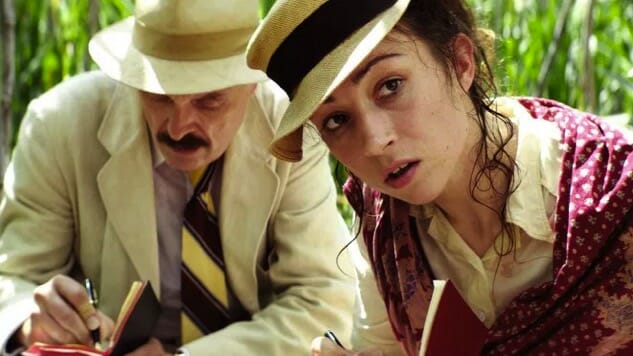Those unfamiliar with the work of Stefan Zweig who go into Stefan Zweig: Farewell to Europe expecting to learn about why he’s considered a significant cultural figure may come away disappointed. To some degree, Maria Schrader’s film demands audience members to already have a certain level of knowledge about the Austrian writer; she so rigorously eschews exposition that those who aren’t prepared with some background knowledge may feel lost at sea, emotionally detached from the moments in Zweig’s life she dramatizes.
But then, that sense of aimless drift is surely not too far off from the way Zweig himself felt in his many years of exile from his home country in the wake of the hurricane of destruction wrought by World War II. Schrader, along with co-writer Jan Schomburg, chooses an intriguing narrative strategy in trying to chronicle these years of displacement. Instead of trying to compress six years—from 1936 to 1942, when Zweig and his wife Lotte were both found dead in Pétropolis, Brazil, from a self-induced barbiturate overdose—into a two-hour film, Schrader and Schomburg focus on six particular episodes during those years, giving us the time and space to observe Zweig in these different environments, Wolfgang Thaler’s camera alive to both the ambiences surrounding the author and the roiling emotions within that he only occasionally lets peek through outwardly.
Each section is marked off like chapters in a book (including a prologue and an epilogue), but the experience of watching Stefan Zweig: Farewell to Europe is more akin to witnessing panels in a mosaic of displacement and regret. Zweig may find himself taking refuge in places as far-flung as Argentina, Brazil, and New York, but a sense of melancholy remains constant in his life during these years. Schrader generally doesn’t try to pin down the specific nature of that melancholy, leaving it mostly as a visceral impression floating through the air, especially through Thaler’s almost-too-elegantly-poised compositions. Naturally, Zweig being the artist he is, though, he can’t help but occasionally verbalize it. “What is my work compared to the reality?” he mournfully says to Ernst Feder (Matthias Brandt), a fellow German expatriate writer/editor now living in Pétropolis.
That lament Zweig offers of his art not being able to measure up to the harsh realities of World War II offers the most consistent thematic thread running throughout Farewell to Europe. An early episode set at a literary conference in Argentina in 1936 sets the stage, as an event in Zweig’s honor turns into a very public denunciation of Nazism from everyone else—a condemnatory pronouncement that Zweig is himself unwilling to make. His reason for that reluctance is made clear in the preceding scene, as he tells an interviewer that he believes in the power of art to speak for itself, and that such grandstanding was, he felt, hardly a sufficient response to the evils Adolf Hitler was unleashing on the world.
And yet, even that faith in art is challenged the longer he remains in his self-imposed exile. According to what Schrader presents to us in Farewell to Europe, a kind of survivor’s guilt on his part contributed to that. In part because of his fame, he was well-connected enough to be able to easily escape the horrors of the Holocaust, and there’s no doubt the relative comfort he experienced during his years in the wilderness is a far cry from what his fellow Jews experienced back home, a fact Zweig is clearly cognizant of, even if he doesn’t always voice it. The film makes passing references to two of his last works—his 1941 nonfiction book Brazil: Land of the Future and his 1942 autobiography The World of Yesterday—but considering the former focuses on a country far away from the horrors of World War II, and the latter focuses on his life before the war, it’s clear that he was less interested in commenting on the present state of the world than on remaining true to his utopian vision of what the world could be, reminiscing wistfully about what it once was and now no longer is. He stayed faithful to his muse, but, as stray lines of dialogue like the quote above suggest, he realized he did so to the point of potential irrelevancy.
The fact that Schrader doesn’t push any of these conclusions on us is certainly admirable. Her reticence, though, isn’t quite enough to banish the suspicion that Stefan Zweig: Farewell to Europe is basically just another Great Man biopic in mildly unconventional clothing. We never really get much of a sense of Zweig as a human being beyond those dialogue signposts and Josef Hader’s poignantly pained facial expressions. The film may not be a hagiography, necessarily, but it similarly turns its central figure into a wax figure, albeit one of deep sadness. Perhaps, though, Zweig fans will get more out of Schrader’s film than neophytes.
Director: Maria Schrader
Writer: Maria Schrader, Jan Schomburg
Starring: Josef Hader, Barbara Sukowa, Matthias Brandt, Charly Huebner, Stephen Singer
Release Date: May 12, 2017
Kenji Fujishima is a freelance film critic, contributing to Slant Magazine, Brooklyn Magazine, The Playlist and the Village Voice. He is also Deputy Editor of Movie Mezzanine. When he’s not watching movies and writing and editing film criticism, he’s trying to absorb as much music, art, and literature as possible. He has not infrequently been called a “culture vulture” for that reason.
